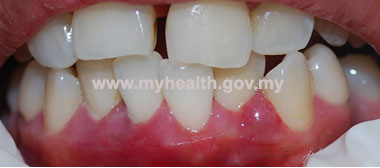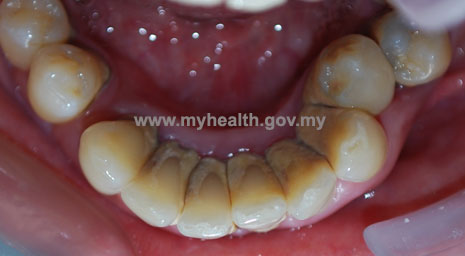Introduction
Periodontal disease is mostly seen in adults. Periodontal disease and tooth decay are the two biggest threats to oral health.
Periodontal disease is bacterial infections of the supporting structures of the teeth which include the gums and bone. If the infection only affects the gums it is called gingivitis. The gums can become swollen and red, and they may bleed upon brushing, and sometimes spontaneously.

In periodontitis, the more serious form of periodontal disease, the bacteria, directly and indirectly may cause destruction of the structures that hold the gums, tooth and bone together. Bone can be lost, and the teeth may loosen or even fall out.
National Oral Health Survey of Adults (NOHSA), Oral Health Division, Ministry of Health Malaysia
| Periodontal Status |
1990(%) |
2000(%) |
2010(%) |
| Periodontal disease all level of severity |
92.8 |
90.2 |
94 |
| Infection of the gum only |
4.2 |
4.8 |
|
| Calculus |
65.1 |
56.9 |
42.2 |
| Severe periodontal disease |
6.0 |
5.5 |
18.2 |
Among the highlight of NOHSA 2010, 94% of dentate adults have some form of periodontal disease, which remains the same for the past 20 years, as seen in the table. Looking into more detail, the severe category, from 6% in 1990 to 17.8 in 2010. There are many possibilities to this increase in prevalence of moderate and severe cases. Amongst them; increase retention of teeth due to increase awareness on oral health, people live longer and better dental services in the country.

Periodontal in other populations
In Sri Lanka, Sri Lankan National Oral Health Survey 2002/2003, the periodontal disease status for ages 35-44 years and 65-74 years with periodontal disease of all severity were 89.9% and 98.1% respectively.
Singapore Adult Oral Health Survey conducted in 2003 found that 85% of 6560 adults aged 20 years and over had mild to moderate forms of periodontal disease.
To date there is no National Oral Health Survey from Indonesia, only two surveys on periodontal treatment needs done by two different institutions, namely Faculty of Dentistry, University of Padjadjaran and Faculty of Dentistry, University of Sumatera Utara.
The percentage of patients in the Dental and Oral Hospital, Faculty of Dentistry University of Padjadjaran (2004), needing prophylaxis treatment for adults group ages 20-34 and 35-65 were 96.34% and 94.72%.
The percentage of adult population around Medan City (2003), age groups 35-44 and 45-65 needing prophylaxis treatment were 85.36% and 67.50%. Whilst in the same age group, 7.14% and 18.75% needed comprehensive treatment.
Causes
Bacteria in the mouth infect tissues surrounding the tooth, causing inflammation around the tooth leading to periodontal disease. When bacteria stay on the teeth long enough, they form a film called plaque, which eventually hardens to form calculus. Calculus build-up can spread below the gum line, which makes the teeth harder to clean. Then, only a dental health professional can remove the tartar and help stop the periodontal disease process.
Warning signs
The following are warning signs of periodontal disease:
- Bad breath or bad taste that won’t go away
- Red or swollen gums
- Tender or bleeding gums
- Painful chewing
- Loose teeth
- Sensitive teeth
- Gums that have pulled away from your teeth
- Any change in the way your teeth fit together when you bite
- Any change in the fit of partial dentures
Risk factors
Certain factors increase the risk for periodontal disease:
- Smoking
- Diabetes
- Poor oral hygiene
- Stress
- Heredity
- Crooked teeth
- Underlying immuno-deficiencies – e.g., AIDS
- Fillings that have become defective
- Taking medications that cause dry mouth
- Bridges that no longer fit properly
- Female hormonal changes, such as with pregnancy or the use of oral contraceptives
Prevention and treatment
Gingivitis can be controlled and treated with maintaining good oral hygiene and regular professional cleaning. Severe forms of periodontal disease can also be treated successfully but may require more extensive treatment. Such treatment might include deep cleaning of the tooth root surfaces below the gums, medications prescribed to take by mouth or placed directly under the gums, and sometimes gum surgery.
What can I do to prevent this disease from developing in my mouth?
To help prevent or control periodontal diseases, it is important to:
- Brushing twice a day and do interdental cleaning once a day for example flossing to remove the bacteria that may cause gum disease.
- See a dentist at least once a year for checkups, or more frequently if you have any of the warning signs or risk factors mentioned above.
Reference:
- National Oral Health Survey on Adults, Malaysia 1990; Bahagian Kesihatan Pergigian, Kementerian Kesihatan Malaysia.
- NOHSA 2000
- NOHSA 2010 (unweighted data)
- National Oral Health Surveys in Sri Lanka (1994/95, 2002/03 unpublished)
- Press Release: The Health Promotion Bill. Parliament proceedings 22 February 2001by Mr Lim Hng Kiang, Minister of Health Singapore
- Prevalence of Periodontitis in Adults in the United States: 2009and 2010. J DENT RES0022034512457373, first published on August 30, 2012
- Morris AJ, Steele J, White DA: The Oral Cleanliness and Periodontal Health of UK Adults in 1998. Br Dent J 2001, 191:186-92
| Last Reviewed | : | 25 April 2014 |
| Writer | : | Dr. Hanizah bt. Abdul Aziz |
| Accreditor | : | Dr. Ahmad Sharifuddin bin Mohd Asari |







